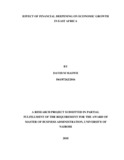| dc.description.abstract | This study determined effects of financial deepening on economic growth in East Africa. Various studies have recognized that since the restructuring and regulation of financial institutions in East Africa from 2012, myriad changes have been witnessed in relation to economic growth. Some countries have witnessed economic growth while other has fully sunk in debts. The study identified that increased level of financial default in the financial sector, unregulated supply of money in the economy, real estate bubble, inflation; limited market information and high level of borrowing in the public sector are among the many financial related challenges affecting economic growth in East Africa. The study aimed at finding solutions to the existing study problems through investigating the effects of rate of broad money in the economy, effects of rate of credit financing and effects of rate of financial markets investment. In the research methodology, the study adopted descriptive research design. The study collected secondary data from Nairobi Securities Exchange, first tier banks and also Central bank financial reports. Data analysis was conducted through SPSS. The study used both descriptive and inferential statistics where inferential statistics composed of correlation and regression analysis. In the study findings, the current study identified that the rate of broad money has grown with a rate of 2.9 Billon Kenya shillings in the last five years, the rate of credit financing in East Africa has dropped with 20% from 2012-2017 while rate of financial markets investment has increased from 0.4 trillion to 1.3 trillion Kenya shillings. In relation to economic growth, findings identified that the economy has grown with a current rate of 6.2%, being the top most witnessed economic growth in Africa. Finding also identified that at Sig P<0.05, there is a relationship between rate of broad money and economic growth, rate pf credit financing and economic growth and also rate of financial markets investment and economic growth. Similarly, the study concluded that broad money in the economy, credit financing and financial market investment affects economic growth. In recommendations, the study urged EAC leadership to encourage free trade, amend policies to encourage investment in financial markets and also educate her community on the need to invest in the local financial markets. In relation to future recommendations, current study suggest that future studies should expand and investigate more on other factors affecting economic growth. Studies should focus on addressing obstacles preventing East Africa from achieving full potential. Future studies should also conduct comparison between effects of financial deepening in short run and long run because previous studies have provided conflicting account on in relation to financial deepening and its effects on economic growth in short run and long run. | en_US |



